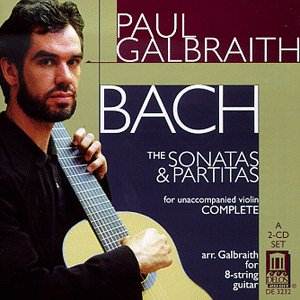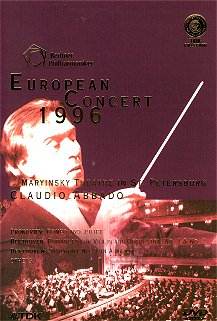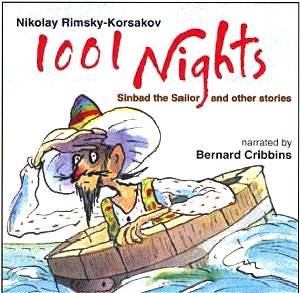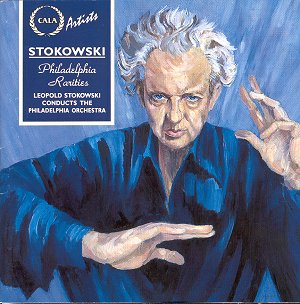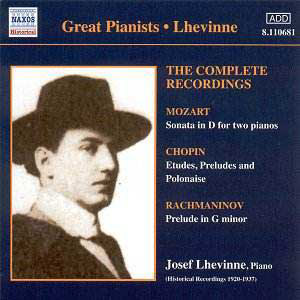 Composer: Josef Lhevinne
Composer: Josef Lhevinne
Works: Mozart – Sonata in D for two pianos K448; Schumann – Toccata in C; Frühlingsnacht arr Liszt; El Contrabandista arr Tausig; Chopin – Etude Op 10 No 6; Etude Op 25 Nos 6, 10, 11; Prelude Op 28 No s 16 and 17; Polonaise Op 53; Johann Strauss II – Blue Danube Waltz arr Schulz-Evler; Debussy – Fetes arr Ravel; Beethoven – Ecossaises; Tchaikovsky – Trepak; Rachmaninov – Prelude in G Minor
Performers: Josef Lhevinne, piano; Rosina Lhevinne, piano (Mozart, Debussy)
Recording: Recorded 1920-1937
Label: Naxos Historical 8.110681
Josef Lhevinne, a titan of early 20th-century pianism, left behind a legacy that continues to resonate through the ages. His recordings, encapsulated in this exemplary compilation, showcase not only his technical prowess but also an artistic sensibility that elevates the music he interprets. Born in 1874 in Russia and educated under the tutelage of Vassily Safonov and Anton Rubinstein, Lhevinne’s artistry was informed by a deep understanding of the Russian musical tradition, which he later synthesized with Western European influences in his New York career. This collection, spanning from 1920 to 1937, reveals the evolution of his interpretative approach and offers invaluable insights into the performance practices of the era.
The first striking element of these recordings is the clarity and precision of Lhevinne’s touch, which is particularly evident in the Mozart Sonata for two pianos. The interplay between Lhevinne and his wife, Rosina, is marked by a buoyant dialogue that captures the spirit of the music with both vigor and grace. Their interpretation eschews sentimental overindulgence in favor of a brisk, spirited execution; the first movement’s fugal entries are articulated with emphatic clarity, creating a lively contrapuntal texture. The slow movement is notable for its warm, inviting character, maintaining a balance between lyrical expression and structural integrity. The finale bursts forth with an infectious energy, showcasing Lhevinne’s ability to navigate rapid passages with both agility and precision.
The recordings of Chopin highlight Lhevinne’s aristocratic aesthetic and his ability to fuse technical brilliance with deep emotional resonance. The Etude Op 10 No 6, performed with seemingly effortless speed, reveals a meticulous control that belies the frenetic nature of the piece. Similarly, the B Minor Etude (Op 25 No 10) is delivered with a fervor that is almost transcendent, the climactic moments expertly calibrated to elicit maximum emotional impact without sacrificing artistic integrity. Lhevinne’s interpretative choices reveal a profound understanding of Chopin’s nuanced emotional landscape, and his ability to navigate the intricate technical demands while maintaining a sense of humanity and grace is undeniably impressive.
The Schumann Toccata stands as a testament to Lhevinne’s historical context; in an era when pianistic bravura often took precedence over musicality, Lhevinne’s performance is refreshingly introspective. His approach is marked by an underlying musicality that subordinates pure virtuosity to the expressive needs of the piece. This contrasts sharply with other renditions that revel in sheer speed, as Lhevinne crafts a narrative that is both imaginative and structurally coherent. The pacing and dynamic contrasts throughout the work are handled with a sophistication that speaks to his deep engagement with the music.
Recording quality is another highlight of this release, with Ward Marston’s remastering significantly enhancing the listening experience compared to previous issues. The sound is notably fuller and more vibrant, allowing Lhevinne’s tonal coloration and phrasing to shine through. The historical recordings, while occasionally marred by technical limitations, present a clear and engaging picture of Lhevinne’s artistry, making this collection essential for those interested in the evolution of piano performance.
This anthology of Josef Lhevinne’s recordings encapsulates a pivotal moment in the history of piano performance. His artistry, characterized by a unique blend of technical brilliance and profound musical insight, sets a high standard for pianists both past and present. The diverse selection of works—ranging from the buoyant charm of Mozart to the emotional depth of Chopin and the vibrant colors of Debussy—demonstrates Lhevinne’s versatility and mastery. These seventy-one minutes offer a compelling glimpse into the mind of a master pianist, ensuring that his legacy remains both relevant and inspiring for generations to come.
